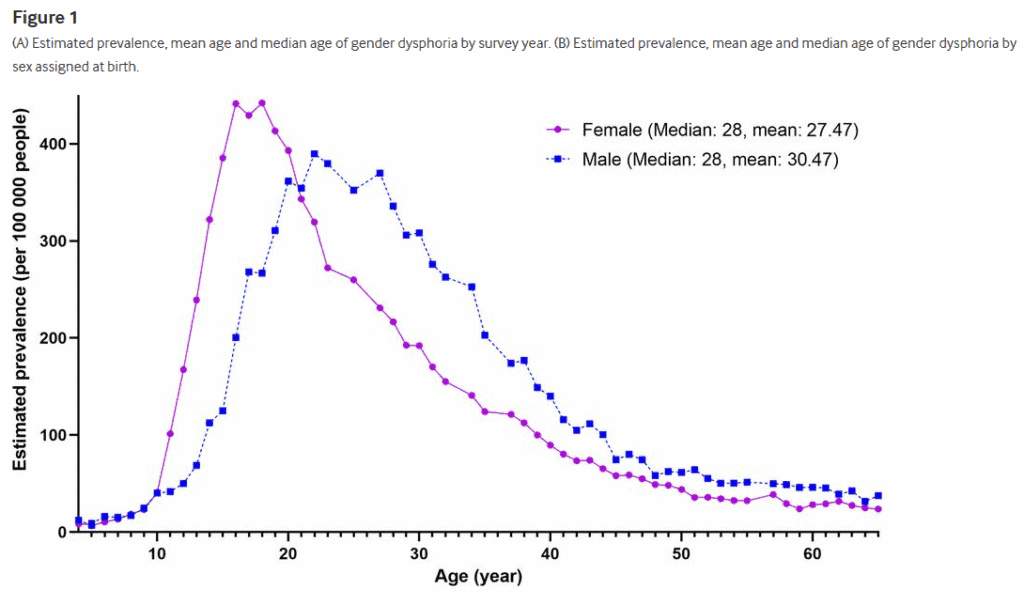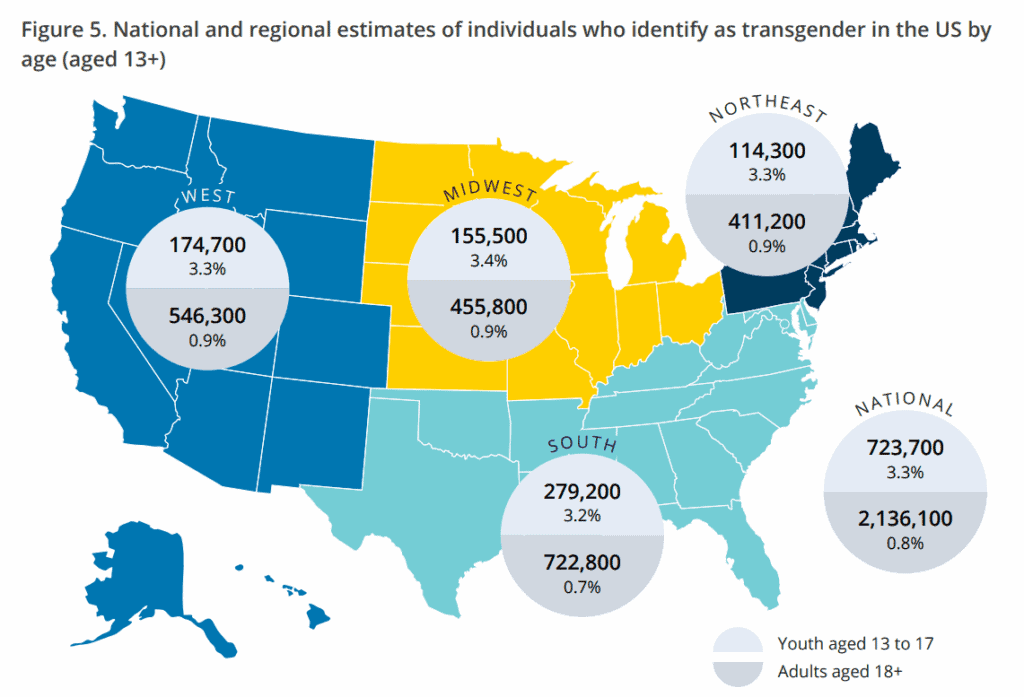It is well established that being “transgender” is a not an objective medical condition. It is not something that can be objectively determined by science; it exists in the very subjective feelings and claims of the individual.
Research continues to document how identifying as “transgender” is a function of age and developmental immaturity. The fact is: The older one becomes, they are markedly less likely to identify as “trans.”
It has been well documented that “trans” youth tend to strongly desist in their gender confusion as they grow into puberty and young adulthood.
A 2024 Dutch study published in the highly respected Archives of Sexual Behavior found that “gender non-contentedness is most common around the age of 11 and that the prevalence decreases with age.”
Conducting research in both clinical and general population samples, this research team found that 11% of early adolescents reported “gender non-contentedness” but this “prevalence decreased with age and was only 4% at the last follow-up (around age 26).” Only 2% reported increasing discomfort with their biological sex as they aged. The study concludes, “Gender non-contentedness, while being relatively common during early adolescence, in general decreases with age and appears to be associated with a poorer self-concept and mental health throughout development.”
A 2021 study examining Taiwanese youth struggling with gender dysphoria showed that only 0.9% were still struggling with gender contentedness by the time they exited their teen years. Some 13% of Taiwanese youth struggled in their teen years, marking a 93% desistance reduction. The research population came from the Taiwan Youth Project and is the first research project tracking gender issues across adolescent development in that nation.
A 2023 British Medical Journal publication found that patients being diagnosed with gender dysphoria are getting younger with those in older age groups increasingly desisting. They chart the rise in gender dysphoric feelings rocketing in early adolescence and then declining sharply in late adolescence and early adulthood.

These scholars conclude that “GD [gender dysphoria] is not a permanent diagnosis” as the “concept of gender is a cultural construct rather than a genetic fact.” It is highly influenced by subjective issues of self-perception, social influence and personal expressiveness.
Additional research by the decidedly pro-gender ideology Williams Institute at the UCLA School of Law finds much the same thing.
“Transgender” identity is highest among teen-age individuals and then starts to drop precipitously from there with age and maturity. Table one on page seven of their report demonstrates just how stark the decline by maturing age is.

Only 0.8% of Americans age 18 and older identify as “transgender” while 3.3% of youth age 13 to 17 do. This is true across the large, diverse populations and geographical locales in the United States. The population of “transgender” identified individuals age 13 to 17 is three times higher across the West, Midwest, Northeast and Southern United States than those aged 18 and older.

Being “transgender” is certainly not something someone objectively is. It is most often a psychic phenomenon, increasingly driven by social influence and immaturity. The older and more mature people get physically, mentally and psycho-sexually, the more likely they become comfortable with their biological sex. Maturity and a rejection of “trans” identity largely follow the same trajectory.
This fact is very telling. We are wise to be mindful of it.
Related Articles and Resources
If you or someone you know is struggling with transgenderism or other sexuality issues, and you don’t know where to turn, Focus on the Family is here to help.
Focus offers a one-time counseling consultation with a licensed or pastoral counselor free of charge thanks to generous donor support. If you would like to request a consultation with Focus’ Counseling Department, call 1-855-771-HELP (4357) weekdays from 6:00 AM to 8:00 PM (Mountain Time) or complete our Counseling Consultation Request Form.
‘Transgender’ Means Many Different Things — and Nothing
Transgenderism and Minors: What Does the Research Really Show?
What Does it Mean to Be Trans, Anyway?
Do Not Fall for the ‘Affirm Them or They Will Die’ Lie
New Research Confirms Previous Findings: Most Gender Confused Kids Desist
The Shifting Ground of ‘Gender-Affirming Care’
How the “Trans” and Gender Redefinition Issue Attacks the Family
How to Respond to “Trans” and Gender Ideology? Simple: Live Not by Lies
Are Sex and Gender Different Things?
No, Trans Rights Are Certainly NOT Human Rights
The Embarrassing Crack-Up of the LGBT Project
Yes, Transgenderism is a False Belief System
Image from Shutterstock.










